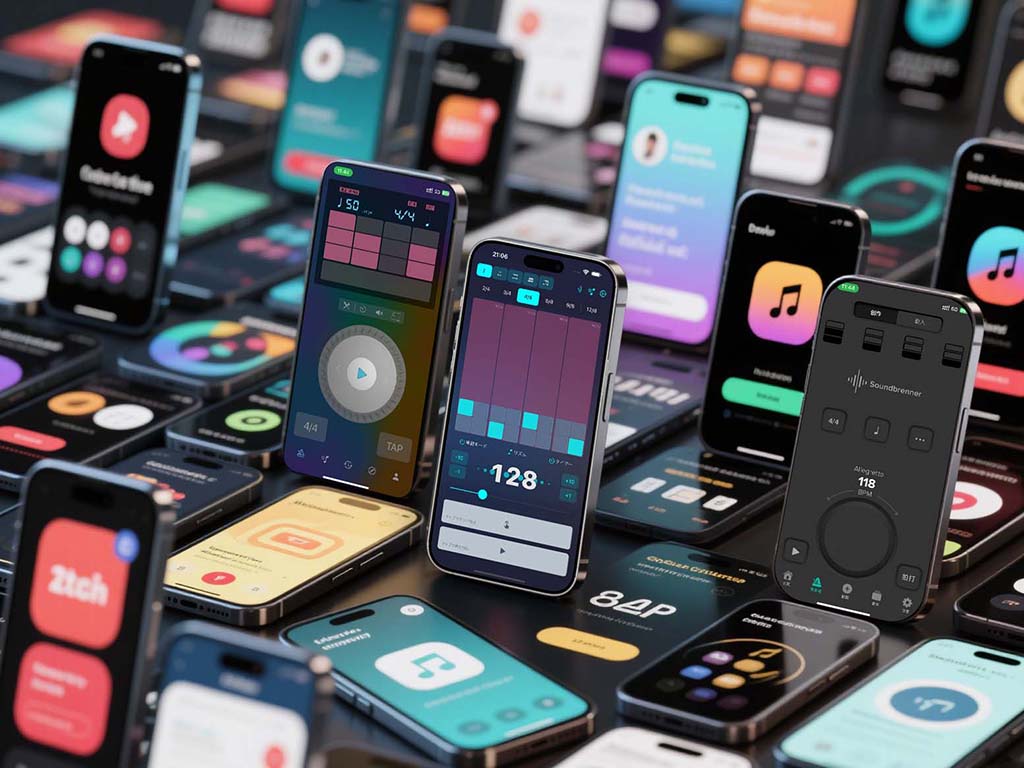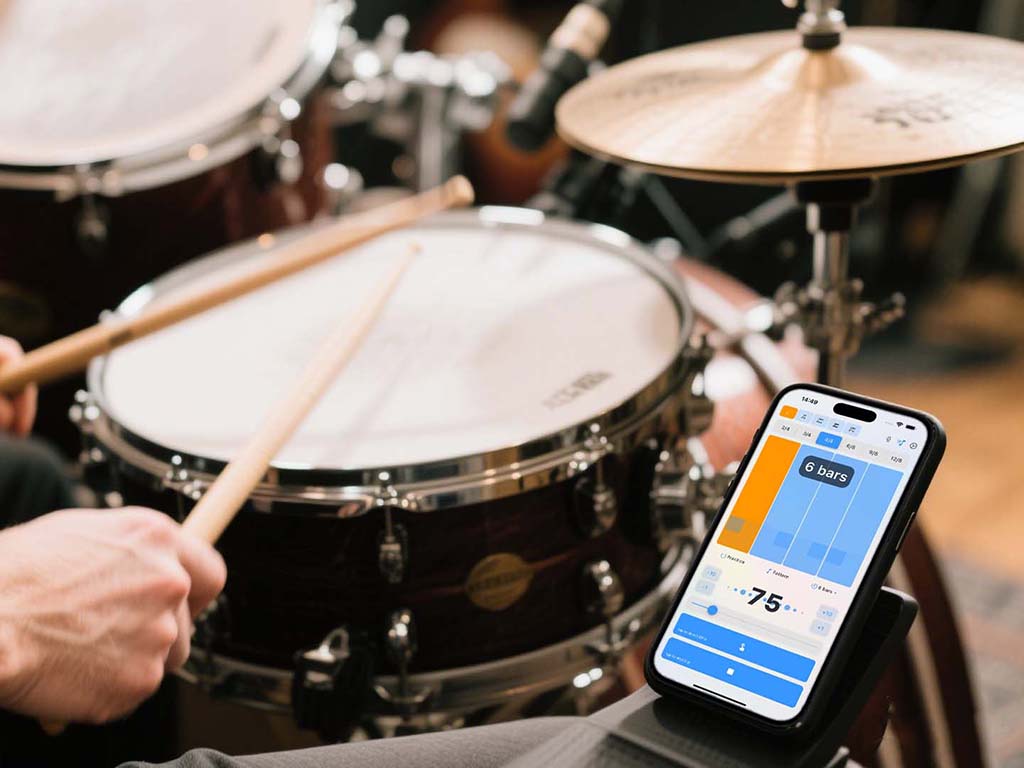With so many metronome apps available today, it can be challenging to determine which one best suits your needs as a musician. In this article, we'll compare some of the most popular metronome apps across different platforms, examining their features, usability, and value to help you make an informed decision.
Why Use a Metronome App?
Before diving into specific apps, let's consider the advantages of using a metronome app over a traditional physical metronome:
- Portability: Your metronome is always with you as long as you have your phone or tablet.
- Advanced features: Many apps offer features not available on physical metronomes, such as complex rhythm patterns, visual cues, and recording capabilities.
- Cost-effectiveness: Many high-quality metronome apps are free or cost significantly less than a good physical metronome.
- Integration: Some apps integrate with other music tools or can export practice sessions.
Top Metronome Apps Compared
1. Metronom - sound mastery TONALY (iOS & Android)
Metronom - sound mastery TONALY is a professional rhythm trainer with advanced audio engine.
Key Features:
- Professional Audio Engine with MIDI sequencer technology
- Supports 1-500 BPM range
- Multiple sound options with customizable volume
- Low-latency audio processing
- Interval Mute Mode and Random Mute Mode for rhythm training
- Visual-only training with independent beat animations
- Built-in rhythm patterns (Bossa Nova, Mambo, etc.)
- Song management with tempo presets and smart playlists
- Export and share your Song List
- Effortlessly define themes, adaptable to various scenarios, and supports landscape interface.
Pros: Combines precision timing with training modes, rich customization for all skill levels
Cons: Advanced features may require in-app purchases
Best for:Beginners and Musicians seeking rhythm mastery (guitar, piano, drums)
2. Pro Metronome (iOS & Android)
Pro Metronome is one of the most popular metronome apps available on both major mobile platforms.
Key Features:
- Visual, auditory, and vibration feedback
- Customizable time signatures and subdivisions
- Polyrhythm support
- Tempo tap feature
- Multiple sound options
Pros: Intuitive interface, accurate timing, great visualization options
Cons: Some advanced features require in-app purchases
Best for: Musicians of all levels looking for a reliable, feature-rich metronome
3. Soundbrenner (iOS & Android)
Soundbrenner is known for its wearable metronome device, but their app stands on its own as an excellent metronome tool.
Key Features:
- Clean, minimalist interface
- Multiple metronomes for polyrhythms
- DAW-style setlist creation
- Integration with Soundbrenner wearable devices
- MIDI sync capabilities
Pros: Beautiful design, powerful rhythm creation tools, great for complex practice routines
Cons: Can be overwhelming for beginners, some features only useful with Soundbrenner hardware
Best for: Advanced musicians and those who own or plan to purchase Soundbrenner wearable devices
4. Time Guru (iOS & Android)
Time Guru offers unique features focused on developing internal timing.
Key Features:
- Muting function that randomly silences beats to test your internal timing
- Customizable accent patterns
- Subdivision capabilities
- Polyrhythm support
Pros: Unique muting feature, excellent for developing internal pulse
Cons: Interface not as polished as some competitors
Best for: Musicians focused on developing their internal sense of time
5. Metronome by Soundcorset (iOS & Android)
A popular free option with a built-in tuner.
Key Features:
- Integrated chromatic tuner
- Practice log to track your sessions
- Tempo tap feature
- Customizable time signatures
- Loop creation
Pros: Completely free, good combination of tuner and metronome
Cons: Ads in free version, fewer advanced features than premium apps
Best for: Beginners and casual practitioners looking for a free solution
6. Dr. Betotte TC (iOS & Android)
A metronome app with a focus on complex rhythms and time signatures.
Key Features:
- Support for complex and changing time signatures
- Programmable setlists with tempo changes
- Extensive accent pattern options
- Visual metronome with customizable appearance
Pros: Excellent for complex music, great for composers and performers of progressive music
Cons: Steeper learning curve, interface can be cluttered
Best for: Advanced musicians working with complex rhythms and changing time signatures
Feature Comparison Chart
Here's a quick comparison of the key features across these popular metronome apps:
| App | Price | Polyrhythms | Visual Cues | Unique Feature |
|---|---|---|---|---|
| Metronome | Free / $4.99 | Yes | Yes | Multiple sound options, Easy for using, Beautiful colors. |
| Pro Metronome | Free / $4.99 | Yes | Yes | Multiple sound options |
| Soundbrenner | Free / $9.99 | Yes | Yes | Wearable integration |
| Time Guru | $2.99 | Yes | Limited | Random muting |
| Soundcorset | Free | No | Yes | Built-in tuner |
| Dr. Betotte TC | $3.99 | Yes | Yes | Complex time signatures |
How to Choose the Right Metronome App
When selecting a metronome app, consider the following factors:
Your Skill Level
Beginners may prefer apps with simple interfaces and basic features, while advanced musicians might need more complex capabilities like polyrhythms and programmable setlists.
Your Instrument
Some apps are better suited for specific instruments. For example, drummers might prefer apps with strong visual components and accent pattern capabilities.
Your Practice Goals
If you're working on developing your internal sense of time, an app like Time Guru with its muting feature might be ideal. If you need to practice pieces with tempo changes, look for apps with programmable setlists.
Your Budget
While many great free options exist, paid apps often offer more features and fewer distractions. Consider whether the additional features of paid apps justify the cost for your specific needs.
Conclusion
The best metronome app for you depends on your specific needs, preferences, and goals as a musician. We recommend trying several free versions before committing to a paid app to find the one that feels most intuitive and helpful for your practice routine.
Remember that regardless of which app you choose, the most important factor is consistent, focused practice with the metronome. Even the most feature-rich app won't improve your timing if you don't use it regularly and mindfully in your practice sessions.
Do you have a favorite metronome app that wasn't mentioned here? Let us know in the comments section below!





